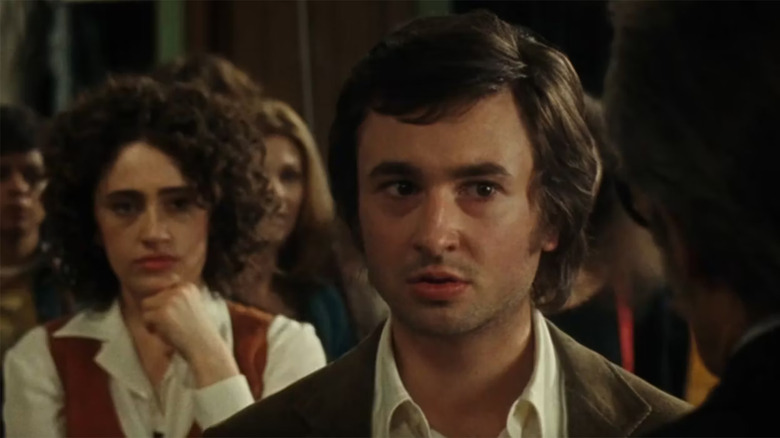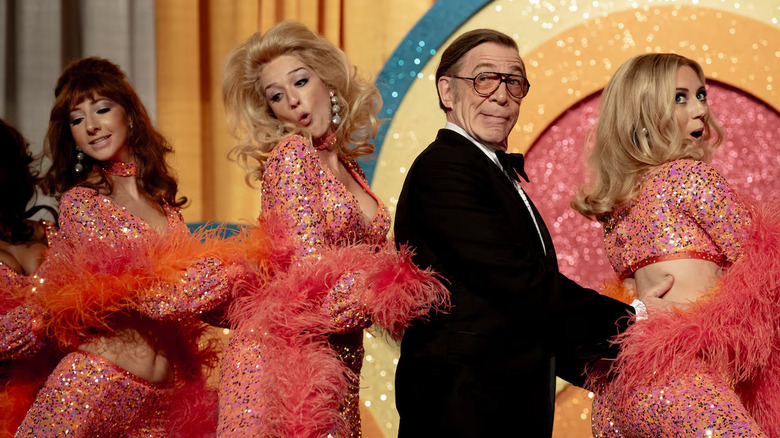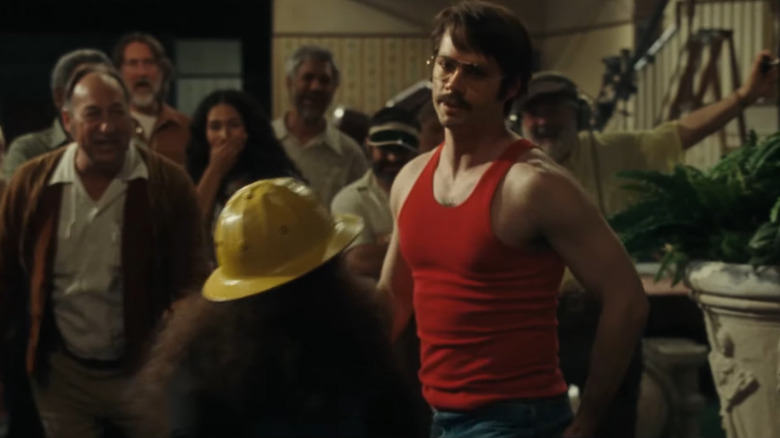The Key Moment From Saturday Night That Was Created At The Last Minute
We may receive a commission on purchases made from links.
Jason Reitman's superb "Saturday Night" features 80 speaking parts, along with dozens of background actors, and a camera that effortlessly weaves through a busy set while capturing the disorderly and anarchic production of the first episode of "Saturday Night Live." That required a lot of meticulous planning, especially when there are long single-take shots that move seamlessly throughout a set that has no edge of frame, which means that everything on that set was designed as if all of it could be seen on camera in any given moment. But even with such careful organization needed to realize this hilarious, frenzied chronicle of showbiz history, Reitman still had moments of last minute inspiration, and one of them resulted in a key scene that serves as a significant moment of realization for showrunner Lorne Michaels (played by "The Fablemans" star Gabriel LaBelle).
As we speed towards the third act of "Saturday Night" and the clock is ticking towards the live premiere of "SNL," Lorne Michaels is still left without a lightning technician. A spectacular crash of the stage lights in Studio 8H resulted in the original crew member being fired in quite the dramatic show of frustration from various members of the production. Having spent most of the night fixing various other problems that have popped up since then, Michaels finally hears that there might be a good replacement on one of the other floors of 30 Rockefeller Plaza, specifically where "The Rumpus Room" variety show is being shot with Milton Berle (J.K. Simmons) and some dancing girls.
When Michaels heads up to "The Rumpus Hour" set to recruit this lighting technician, Milton Berle is dancing with his girls, so he's waiting in the wings for the take to be finished so he can steal his new crew member. As he looks upon the remnants of old television, the tired formula of aging television personalities delivering the same old thing, his gaze shifts to the show's director, who is sitting miserably in a production chair with a cigarette in hand, staring off into the distance, not even paying attention to the show's taping. It's a moment where Michaels needed a boost to keep going in the face of increasingly insurmountable odds, and he rushes to snag his new lighting technician and get "Saturday Night" live on the air.
Believe it or not, this key moment for Lorne Michaels as a character was a last minute addition on the day of shooting.
Something was missing
Around the Toronto International Film Festival premiere of "Saturday Night" in September, I spoke with Jason Reitman about his superb "SNL" movie, and I couldn't help but hone in on that Lorne Michaels moment. After all, the movie is mostly focused on getting the premiere of "SNL" off the ground, but this serves as one of only a few moments that gives us some kind of insight into the mindset of Lorne Michaels as he frantically moves through what will soon become TV history. I asked Reitman if that moment came from something they learned in the extensive interviews that were conducted while developing and writing the movie, and here's what the filmmaker had to say:
"That moment happened the day of, I was just figuring that shot out, because it's a long shot. It takes them all the way from the elevator through the whole 'Rumpus Hour,' up the stairs. And I felt like something was missing. And I thought, 'Oh, you know what'd be really interesting? If Lorne saw this alternate future; who would he be if he didn't stand up for himself? Who would he be if he didn't follow his convictions?' And then the funny thing is I have to go through all the background actors and be like, 'Who looks like failure? Maybe him sitting on that chair looking off into the middle distance.'"
Hopefully, the actor who played the part didn't find out what kind of look Reitman was going for, because that could be rather demoralizing.
With a movie that's so focused on "SNL" reaching the finish line for the show's premiere, there are a handful of character moments like this that are more about the people within the show than the series itself. In fact, another one of them was a last minute suggestion from Reitman for Dylan O'Brien's performance as Dan Aykroyd.
Dan Aykroyd gets a little embarrassed
In the middle of "Saturday Night," we see a rehearsal for a sketch where a group of female construction workers played by Gilda Radner (Ella Hunt), Jane Curtin (Kim Matula), and Laraine Newman (Emily Fairn) are catcalling Dan Aykroyd, as he appears in a red tanktop and high-cut jean shorts (you can spot it in the movie's promotional material). There's a brief moment where Aykroyd appears to be rather shy and embarrassed by what he's meant to do, and he's initially resistant to remove the robe hiding his wardrobe. But with the encouragement of Rosie Shuster (Rachel Sennott) and the rest of the ladies, he disrobes and starts flexing and posing for the women to their delight. Funnily enough, that sketch didn't end up in the premiere (just like a bit by Billy Crystal, who has a small role in the movie, played by Nicholas Podany), and it wouldn't debut until Lily Tomlin hosted the sixth episode of the first season on November 22, 1975.
During an interview with some of the cast of "Saturday Night," I asked Dylan O'Brien about that small moment, and it turned out it's another idea that came directly from Reitman on the day of shooting:
"I was directed, yeah, literally. Credit to Jason, because I keep getting feedback that people love that scene, and I would not have approached that scene that way. I wouldn't have guessed that Dan would be embarrassed to wear the short shorts. I wasn't embarrassed to have the short shorts on, so it's not how I would done it. He's like, 'No, no, I want you to be self-conscious and embarrassed.' And I was like, 'Oh! I'm so sorry.' I was like, 'Woo-hoo!' [mimes waving robe around]. That was totally a direction that was given to me."
When you're making a movie about a show that flies by the seat of its pants with every new episode, writing, editing, and readjusting down to the very last minute, even while the show is already on the air, it only makes sense to have the same kind of creative freedom while you're shooting. It keeps the spirit of the show alive in the movie, and it captures the thrilling vibe that has kept "SNL" a staple across 50 years of TV history.
"Saturday Night" is available for rent and purchase on Prime Video.


